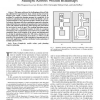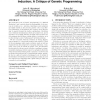990 search results - page 51 / 198 » Using evolution strategies to solve DEC-POMDP problems |
GECCO
2008
Springer
13 years 9 months ago
2008
Springer
Hereditary Repulsion (HR) is a selection method coupled with a fitness constraint that substantially improves the performance and consistency of evolutionary algorithms. This als...
GECCO
2011
Springer
12 years 11 months ago
2011
Springer
The reward functions that drive reinforcement learning systems are generally derived directly from the descriptions of the problems that the systems are being used to solve. In so...
AIMSA
2008
Springer
14 years 2 months ago
2008
Springer
Abstract. Computational Grids provide a widely distributed computing environment suitable for randomized SAT solving. This paper develops techniques for incorporating learning, kno...
TROB
2008
13 years 8 months ago
2008
Abstract--This paper addresses the challenging problem of finding collision-free trajectories for many robots moving toward individual goals within a common environment. Most popul...
GECCO
2009
Springer
14 years 2 months ago
2009
Springer
We revisit the roots of Genetic Programming (i.e. Natural Evolution), and conclude that the mechanisms of the process of evolution (i.e. selection, inheritance and variation) are ...


